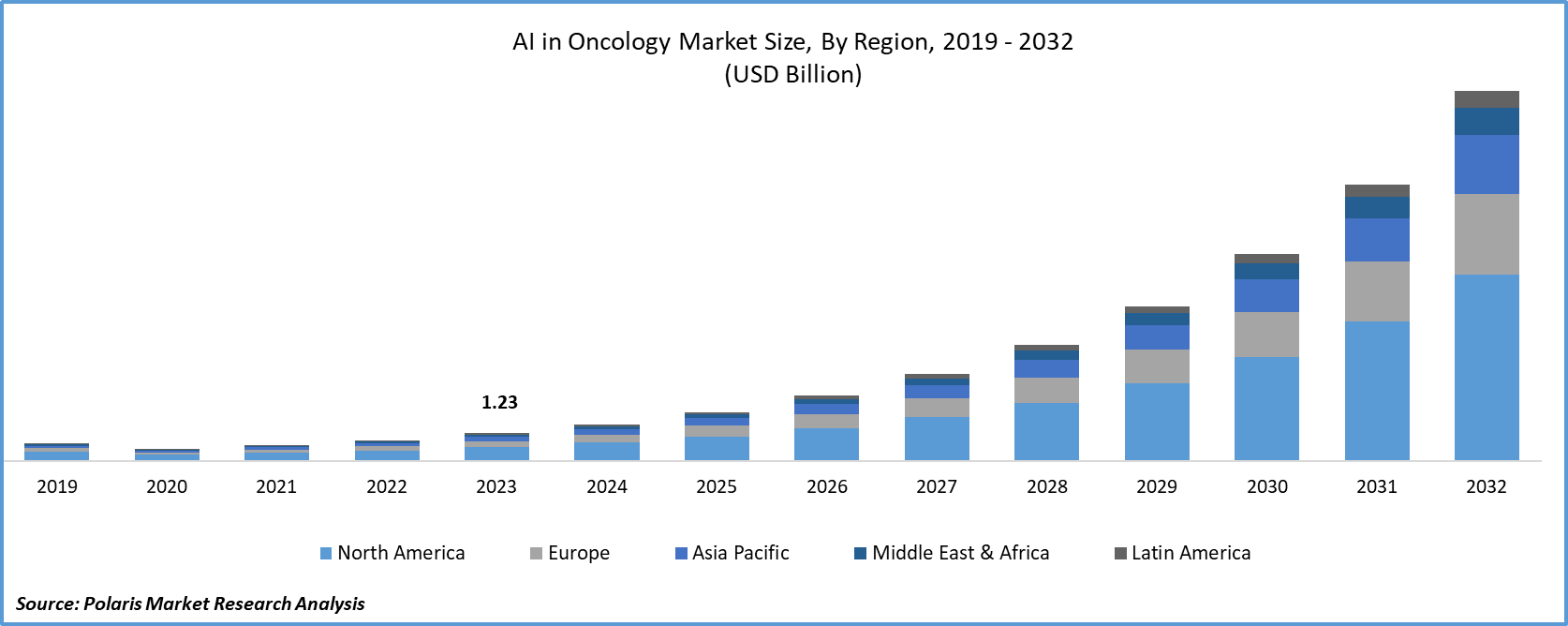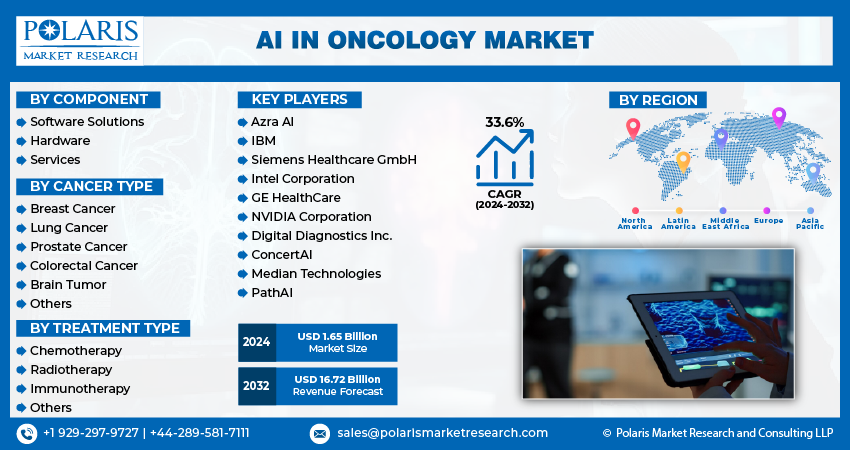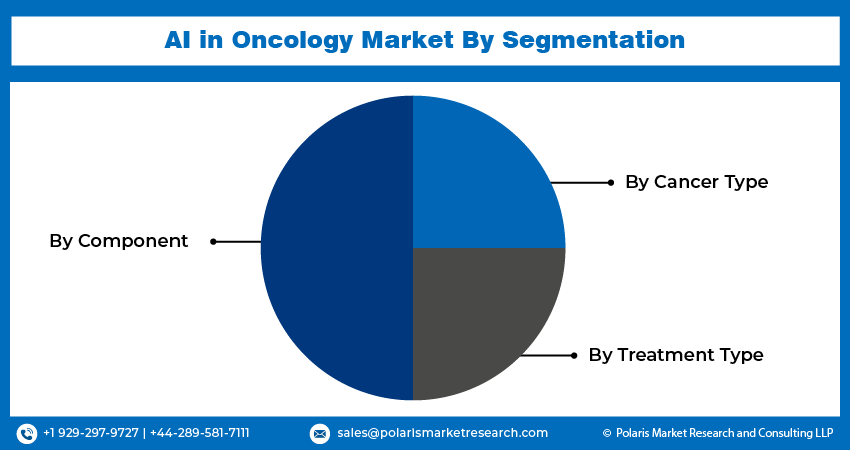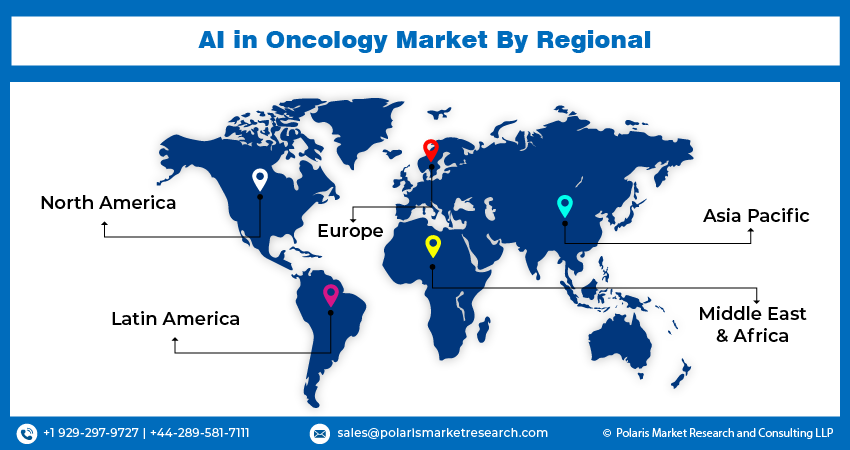
AI in oncology Market Share, Size, Trends, Industry Analysis Report, By Component Type (Software Solutions, Hardware), By Cancer Type (Breast Cancer, Lung Cancer), By Treatment Type, By Region, And Segment Forecasts, 2024 - 2032
- Published Date:Jan-2024
- Pages: 116
- Format: PDF
- Report ID: PM4153
- Base Year: 2023
- Historical Data: 2019-2022
Report Outlook
The global AI in oncology market was valued at USD 1.23 billion in 2023 and is expected to grow at a CAGR of 33.6% during the forecast period.
The market's expansion is driven by the growing prevalence of cancer, advancements in cancer diagnostics technology and healthcare infrastructure, and a rising demand for early and precise cancer diagnosis. Initiatives by both public and private organizations to invest in research and development (R&D) for the introduction of innovative technologies are expected to contribute significantly to the market's growth.

To Understand More About this Research: Request a Free Sample Report
The AI in oncology market is experiencing growth due to technological advancements & integration of the AI in applications such as classification, detection, characterization, & monitoring. Investments by both government and private entities in the oncology field to adopt artificial intelligence are improving diagnostic and therapeutic capabilities, providing more efficient oncological solutions. For instance, and AI tool “QAi Prostate” introduce by the Qritive, in March 2023, a novel AI-powered tool for diagnosing the prostate cancer. This product facilitates accurate identification of prostatic adeno-carcinoma regions and the classification of benign & malignant tumors in the biopsy samples.
The market experienced a positive impact from the COVID-19 pandemic as it spurred a heightened demand for the application of AI in oncology. Global restrictions on movement, especially in hospitals and homecare settings, posed significant challenges to patients' diagnosis, care, and treatment. The necessity to develop products capable of offering solutions in remote locations, particularly at an early stage, saw a substantial increase. Moreover, the shortage of medical professionals further amplified the use of AI to deliver improved results for patients.
Market faces challenges due to stringent regulations linked to artificial intelligence-enabled products and concerns about the high costs and potential displacement of the human workforce. Despite these challenges, the increased adoption of AI, particularly during the pandemic when medical professional shortages were prominent, is anticipated to contribute to the market's growth.

Growth Drivers
Increasing Prevalence of Cancer
The substantial growth of the market can be attributed to the escalating global prevalence of cancer. According to the WHO, cancer stands as the primary cause of the death across the globe, contributing to the demise of nearly one in every six individuals, totaling 10 Mn people globally. Most of these cancer-related deaths are attributed to lung cancer, accounting for 2.2 Mn cases & 1.8 Mn deaths, in 2020. The surge in cancer prevalence, coupled with shortages of healthcare professionals, is driving the adoption of AI. This adoption aims to address the increasing demand for innovative solutions that can deliver efficient and accurate diagnoses and treatments.
Report Segmentation
The market is primarily segmented based on component, cancer type, treatment type, and region.
|
By Component |
By Cancer Type |
By Treatment Type |
By Region |
|
|
|
|
To Understand the Scope of this Report: Speak to Analyst

By Component Analysis
Software Solutions Segment Held the Largest Share
Software solutions segment held the largest share and is projected to register substantial growth rate over the study period. This trend is attributed to the escalating utilization of software solutions in the development of optimized oncological products, coupled with the enhanced outcomes associated with their use. Market players are actively engaged in the development of innovative solutions, aiming to increase accessibility to a broader population.
Growth is also fueled by the emergence of entrepreneurial start-ups offering innovative solutions for cancer treatment and prediction. For instance, MedCognetics, which obtained FDA approval in December 2022 for the “QmTRIAGE”, an AI-enabled platform designed for the breast cancer screening. The platform is anticipated to diminish both the cost and time associated with imaging while enhancing overall outcomes.
By Cancer Type Analysis
Breast Cancer Segment Registered the Largest Market Share in 2023
Breast cancer segment accounted for the largest share. This dominance is linked to the rising prevalence of breast cancer globally. In 2020, the American Society of Clinical Oncology reported approximately 2,261,419 new cancer cases worldwide, with a significant portion observed in the U.S., projecting an estimated 297,790 new breast cancer cases, in 2023. The escalating incidence of cancer in the population is driving the demand for advanced technological products in the market, fostering overall market growth.
Brain tumor segment will grow rapidly. The integration of AI and advanced imaging technology plays a crucial role in achieving accurate diagnoses of brain tumors during surgery within a short time frame of 3 minutes. This technology is instrumental in distinguishing between tumors and healthy tissues. The application of various deep learning models has also proven beneficial for the neurologists, contributing to the continued growth of this segment.
By Treatment Type Analysis
Chemotherapy Segment Held the Significant Market Revenue Share in 2023
Chemotherapy segment held the largest share. Chemotherapy is a widely utilized cancer treatment, with an estimated 60% of Stage 4 bladder cancer patients undergoing this procedure, as reported by the American Cancer Society. The integration of AI into chemotherapy treatment supports healthcare professionals in creating personalized digital profiles for patients, enabling the customization of dosage during treatment. Ongoing research efforts to integrate AI into chemotherapy contribute to the growth of this segment. Furthermore, the use of AI to provide customized chemotherapy with reduced dosage and fewer side effects is fostering the adoption of chemotherapy.
Immunotherapy segment will grow at the substantial pace. Segment’s growth is driven by the substantial positive outcomes observed in clinical studies, demonstrating high efficacy, and an increasing number of approvals for immunotherapy. For instance, in January 2023, a new AI-based biomarker was introduced to aid in predicting immunotherapy response for lung cancer patients. Additionally, the incorporation of AI enhances the accuracy of immunotherapy. According to a ScienceDirect article, AI can identify major histocompatibility complex patterns associated with a 91.66% accuracy rate in predicting immunotherapy response. This is anticipated to positively influence the adoption of this segment.
Regional Insights
North America Region Held the Largest Share of the Global Market in 2023
The North America region dominated the market. This dominance is attributed to the well-established digital infrastructure, favorable reimbursement policies, and increasing government initiatives aimed at promoting the adoption of AI in healthcare sector. The growing prevalence of various cancers is driving the demand for the development of advanced therapeutics and diagnostics, contributing to the regional market's growth.
The Asia Pacific region projected to grow at the rapid pace. This growth can be attributed to the increasing adoption of digitalization in diagnostic laboratories and hospitals, supported by a growing geriatric population and a rising prevalence of cancer among the population. For instance, according to Globocan's data in 2020, there were approximately 19 million new cancer cases globally, with Asia-Pacific contributing significantly with 9.7 million cases.

Key Market Players & Competitive Insights
Some of the major players operating in the global market include:
- Azra AI
- IBM
- Siemens Healthcare GmbH
- Intel Corporation
- GE HealthCare
- NVIDIA Corporation
- Digital Diagnostics Inc.
- ConcertAI
- Median Technologies
- PathAI
Recent Developments
- In January 2023, Massive Bio has announced its intention to incorporate AI in the field of oncology through the development and launch of a product focused on drug matching.
- In February 2023, M2Gen has partnered with the Zephyr AI with the goal of advancing drug & target discovery for the oncology treatments.
- In February 2023, Hackensack Meridian has collaborated with introduced an AI based brain cancer treatment. It is designed to support the Neosoma method of tracking, data collection, & tracking.
- In March 2023, Illumina introduced Connected Insights, a new software designed to facilitate tertiary analysis for applications in oncology, with potential expansion into rare diseases. The software aims to streamline reporting and interpretation across various assay types, enhancing workflow efficiency and saving time.
AI in Oncology Market Report Scope
|
Report Attributes |
Details |
|
Market size value in 2024 |
USD 1.65 billion |
|
Revenue forecast in 2032 |
USD 16.72 billion |
|
CAGR |
33.6% from 2024 – 2032 |
|
Base year |
2023 |
|
Historical data |
2019 – 2022 |
|
Forecast period |
2024 – 2032 |
|
Quantitative units |
Revenue in USD billion and CAGR from 2024 to 2032 |
|
Segments covered |
By Component, Cancer Type, Treatment Type, By Region |
|
Regional scope |
North America, Europe, Asia Pacific, Latin America, Middle East & Africa |
|
Customization |
Report customization as per your requirements with respect to countries, region, and segmentation. |
FAQ's
The global AI in oncology market size is expected to reach USD 16.72 billion by 2032
Key players in the market are Azra AI, IBM, Siemens Healthcare, Intel, GE HealthCare, NVIDIA
North America contribute notably towards the global AI in oncology market
The global AI in oncology market is expected to grow at a CAGR of 33.6% during the forecast period.
The AI in oncology market report covering key segments are component, cancer type, treatment type, and region.
